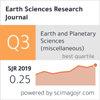Finite Element Analysis Method of Slope Stability based on Fuzzy Statistics
IF 0.5
4区 地球科学
Q4 GEOSCIENCES, MULTIDISCIPLINARY
引用次数: 5
Abstract
How to cite item Wang, Z., & Lin, M. (2021). Finite Element Analysis Method of Slope Stability based on Fuzzy Statistics. Earth Sciences Research Journal, 25(1), 123-130. DOI: https://doi. org/10.15446/esrj.v25n1.93320 In order to reduce the risk of slope stability evaluation due to the fuzziness of calculation parameters, a finite element analysis method of slope stability based on fuzzy statistics is proposed. Based on the principle of quasi-static method and with the help of the finite element software COMSOL multiphysics, this paper studies the stability of the gravel soil accumulation rock slope under the action of different seismic acceleration. By analyzing the displacement, plastic zone and safety factor of the rock soil slope, the stability of the rock soil slope is analyzed. The research results show that the fuzziness of mechanical parameters of rock and soil slope will lead to the fuzziness of position displacement and stress analysis results of rock and soil slope, and the analysis of rock and soil slope with the method of fuzzy finite element analysis can strengthen the comprehensive understanding of position displacement, stress and safety of rock and soil slope by engineers and technicians, and reduce the stability of rock and soil slope due to the fuzziness of calculation parameters to a certain extent Evaluate the risk qualitatively. ABSTRACT Finite element analysis method of slope stability based on fuzzy statistics基于模糊统计的边坡稳定性有限元分析方法
如何引用项目王,中,林,M(2021)。基于模糊统计的边坡稳定性有限元分析方法。《地球科学研究杂志》,25(1),123-130。DOI:https://doi.org/10.15446/esrj.v25n1.93320为了降低由于计算参数的模糊性而导致的边坡稳定性评价风险,提出了一种基于模糊统计的边坡稳定性有限元分析方法。基于准静态方法的原理,借助有限元软件COMSOL multiphysics,研究了不同地震加速度作用下砾石土堆积岩质边坡的稳定性。通过分析岩土边坡的位移、塑性区和安全系数,对岩土边坡进行了稳定性分析。研究结果表明,岩土边坡力学参数的模糊性会导致岩土边坡位置位移和应力分析结果的模糊性,采用模糊有限元分析方法对岩土边坡进行分析可以加强对位置位移的全面认识,工程技术人员对岩土边坡的应力和安全性进行了研究,并在一定程度上由于计算参数的模糊性而降低了岩土边坡稳定性。基于模糊统计的边坡稳定性有限元分析方法
本文章由计算机程序翻译,如有差异,请以英文原文为准。
求助全文
约1分钟内获得全文
求助全文
来源期刊

Earth Sciences Research Journal
地学-地球科学综合
CiteScore
1.50
自引率
0.00%
发文量
0
审稿时长
>12 weeks
期刊介绍:
ESRJ publishes the results from technical and scientific research on various disciplines of Earth Sciences and its interactions with several engineering applications.
Works will only be considered if not previously published anywhere else. Manuscripts must contain information derived from scientific research projects or technical developments. The ideas expressed by publishing in ESRJ are the sole responsibility of the authors.
We gladly consider manuscripts in the following subject areas:
-Geophysics: Seismology, Seismic Prospecting, Gravimetric, Magnetic and Electrical methods.
-Geology: Volcanology, Tectonics, Neotectonics, Geomorphology, Geochemistry, Geothermal Energy, ---Glaciology, Ore Geology, Environmental Geology, Geological Hazards.
-Geodesy: Geodynamics, GPS measurements applied to geological and geophysical problems.
-Basic Sciences and Computer Science applied to Geology and Geophysics.
-Meteorology and Atmospheric Sciences.
-Oceanography.
-Planetary Sciences.
-Engineering: Earthquake Engineering and Seismology Engineering, Geological Engineering, Geotechnics.
 求助内容:
求助内容: 应助结果提醒方式:
应助结果提醒方式:


